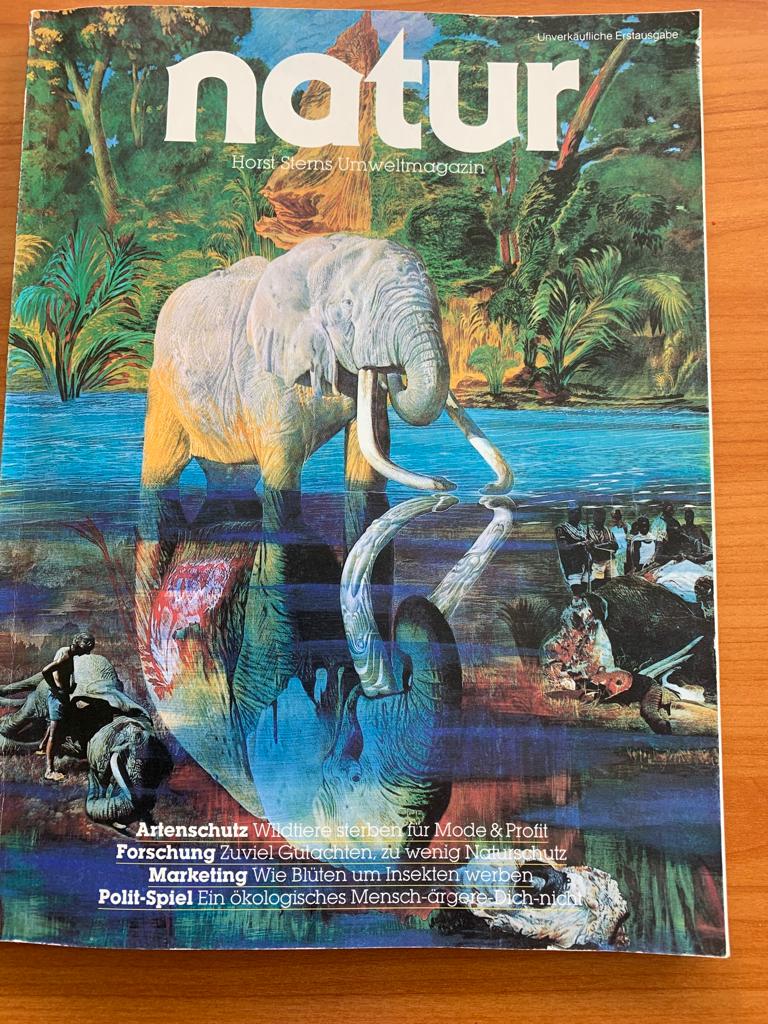
100th birthday of Horst Stern
Prof`in Dr. Gela Preisfeld
Photo Preisfeld: Sebastian Jarych
The furious defender of nature
Prof`in Dr. Gela Preisfeld on the 100th birthday of Horst Stern
The science journalist, filmmaker and writer Horst Stern would have turned 100 on October 22. Who was this man?
Preisfeld: An uncomfortable man, I think that's the first thing to say. He wasn't actually a trained journalist or editor, but a banker, but then he got into journalism. He was a war reporter, then at some point became a radio reporter for animal programs, and has developed into a filmmaker. What distinguishes him is that he is very touched by nature. This touch and defenselessness of animals and nature, have created in him this special mixture that made him actually quite an angry defender of nature. I remember very clearly his films, some of which were shocking.
Where did his interest in the animal world come from?
Preisfeld: I don't know specifically, but I think it's this touchedness, he felt addressed by the animals. He was not only concerned with animals, but with nature as a whole. He had a special connection to the animal world and I think he also dealt with it a lot in his childhood and youth.
Horst Stern dealt a lot with native animal species. His message was clear: a chicken is a running animal and does not belong in a cage, a cow is a grazer and does not belong on slatted floors, and a horse should not be shooed over 1.80 meter high hurdles. You don't make any friends with that, do you?
Preisfeld: That's right, you don't make friends with people who treat animals that way. On the one hand, he has succeeded in shaking people up, shocking them, addressing them directly, meeting them, but in doing so, he has also sometimes angered them. Some of them changed their ways positively afterwards. He has turned practically everyone against him and has made trouble with many. The hunters, because he didn't appreciate their way of keeping, because they kept in such a way that there were always many animals to shoot. That annoyed him and also that the killing of animals is considered a sport -that also annoys me-; he naturally annoyed the economy with his demand for consideration for nature and thus he was already a kind of pioneer for sustainable management. He discovered the advantage of sustainability very early on and tried to pass the idea on to the business community. He also antagonized farmers because he wanted near-natural agriculture, demanded ecological measures, actually called for modern organic farming. He urged the abandonment of pesticides and herbicides, which unfortunately are still used far too much today. And he opposed the cruelty to animals that is simply accepted, especially in factory farming. He brought even the nature conservationists up against him, which one may not believe, but just at the quite well-known example of the red deer, he demanded their shooting instead of their protection, because they destroy our forest. There he addresses the ecological disproportion in our ecosystems, because there are no natural enemies, except the hunters, and if they do not act, an even greater disproportion between the animals in the forest and the plants arises. And to top it off, he also had it out with the animal lovers, because he also rejected their humanizing "cuddly view". Stern also in no way wanted to ride the coattails of other filmmakers who dramatized the elegant jaguar or the fear-mongering anaconda. He wanted the animals to be seen for what they are.
He also made television history with a total of 24 episodes in the series "Stern's Hour." His episodes about the domestic chicken or the domestic pig infuriated the population because he also clearly pointed out grievances. How did he do that?
Preisfeld: Quite simply, he showed the truth. He went to slaughterhouses, pigsties and chicken coops and filmed the conditions there. Then you saw the endless suffering of the animals. Unfortunately, until today nothing or at least not much has changed. It was never lurid or hip, but always rather sober and showed us what the consequences of our luxurious standard of living are. And that shocked and angered people. With that Red Deer movie, which then aired on Christmas Eve, even though that was the station's decision, it turned a lot of people against itself. Nevertheless, they obviously turned on again....
He introduced one of his broadcasts with the following sentence: "I beg you, persevere! You owe it to the credibility of your foreseeable protest. A society that seems to be almost addicted to fictitious violence on television should at least once, I think, have the courage to look into the face of that real violence that is perpetrated thousands of times a day on animals in the name of all of us." You hadn't experienced animal shows like that before, had you?
Preisfeld: You really hadn't ! It was shocking. It didn't show anything cuddly, nothing exotic, but it showed what's going on here with us. Nobody goes to the slaughterhouse voluntarily, you don't want to watch that, but you actually have to if you are willing to eat meat, at least in the masses in which we consume meat. He was getting a message across to people with that. Some of that was on entertainment television, but he used that to actually bring the abuses to the layperson. Stern always tried to bring knowledge and society together, to get science out of the ivory tower and present it in an understandable way. He has succeeded in doing this in these programs, which I have also seen, and they have not failed to have an effect on me. Today I am a vegan.
In 1975, together with Bernhard Grzimek and others, he founded the Bund für Umwelt und Naturschutz Deutschland (BUND), which now has almost 500,000 members and must be consulted on all interventions in the natural environment. Can he be considered one of the first environmental activists?
Preisfeld: Definitely as an environmental activist; there may have been one or two others before him, but he took his activity further. He co-founded the German Environmental Foundation and also the BUND, which still has its impact today as an influential association. He was certainly an environmental activist, although I'm sure he wouldn't have liked to hear that, because he was also very self-critical and oriented himself more toward his failures than his successes. That also ultimately led to his complete withdrawal. He was someone who brought the environment into focus, and that is definitely to his credit. His activities have led to political debates and thus he has moved a lot.

Cover page of the first edition "Nature", painted by Ernst Fuchs
Photo: UniService Transfer
In 1980, he founded the magazine "Natur" and spent the following decades fighting against forest and species extinction, factory farming and genetic engineering. With his book "Save the Forest," he is considered one of the first to draw attention to forest dieback. What is the significance of Horst Stern, who was neither a zoologist nor a biologist, for these disciplines?
Preisfeld: His concern was quite clear; I still have the first issue of the magazine "Natur," which I really devoured at the time, and the editorial is still worth reading. For example, he asked himself the question: How do you make the findings of science effective in sociopolitical terms? Its relevance to zoology and biology? After all, he mainly presented ecological connections, something that was known to scientists at the time, but not to society as such. In other words, the question of the connections between action and nature. If a plant dies out, what are the consequences for the food web of the entire community? What happens to the butterfly, which then can no longer suck the nectar? What happens when spruce trees die in the forest, when there are too many red deer, or like today, the bark beetle? He has brought new combinations of thinking to people. He has shown that ecology must always be thought of in context. You can't look at the individual animal or plant. In this way, he influenced nature conservation in general, not just individual disciplines. He has promoted understanding and thus achieved a great deal. The anti-nuclear power movement, the emergence of the Greens, all that happened in that time, and Stern played an important role in it.
What is the legacy of this pugnacious spirit?
Preisfeld: If you take a superficial look at the world, you might think that he didn't really have any effect at all, because the grievances are still there. There are still slaughterhouses, forest dieback has gotten worse, the climate catastrophe is coming, and he had already talked about that. That look was always his concern. He said that he might have made a difference with the little ones, by which he meant the individual people in society, but not really with the big ones, that is, the politicians and the business community, the decision-makers. But I don't see it so dramatically. I think he has had a great impact, and people are becoming more and more aware of nature, the whole organic movement, or that people don't eat so much meat, or buy organic vegetables, and drive less. Of course, man is a luxury creature and is only willing to change when he feels the consequences of his own actions. At the moment, the willingness is great, because we all feel the climate changes, or still have the horror of last year's flood disaster in our minds. Then we are ready to do something. And the wake-up call was to his credit. He also never put politics and business in the corner of the bad guys; he always sought dialogue and looked for compromises and solutions. That is also something we find again in the current government. We have to find compromises, and that is perhaps Stern's legacy. An admirable man.
Uwe Blass
Professor Dr. Gela Preisfeld studied, received her doctorate and habilitated at the University of Bielefeld. After short research stays in Australia and a substitute position at the Goethe University Frankfurt/Main, she accepted the appointment to the chair of Biology and its Didactics, Zoology at the Bergische University in 2006.
